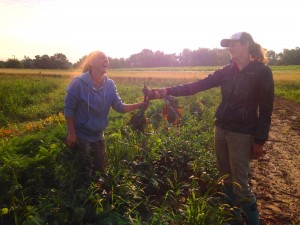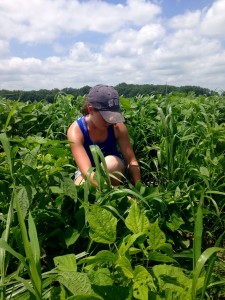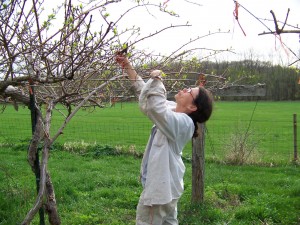Annie’s Project empowers growing number of state’s women farmers
By Mary M. Flory Chronicle Media — January 20, 2016

Annette McKeown (right) and Cassidy Dellorto-Blackwell are part of the work crew at the PrairiErth farm in Atlanta, Ill. (Photo courtesy PrairiErth farm)
The American farm is smack-dab in the middle of a female-led renaissance and, chances are, you likely know someone in your community who is at least partially responsible.
Women are leading the charge with community supported agriculture groups (CSAs), farmers’ markets, farming apprenticeships and business skills that help them master everything from cash flow to crop marketing.
Some of these women are transplants to the farming industry, others have always been there supporting family farming ventures without formal, Census-based recognition of their efforts.
Regardless of their path to the farm, though, female farmers have a foothold in 2016, and with state-led support and educational efforts, Illinois women, their farms and the communities that they support will only grow stronger.
The University of Illinois Extension Service hopes to encourage that growth through a separate series of programs next month at the Winnebago-Boone County Farm Bureau and the DeKalb County Farm Bureau.
According to the United States Department of Agriculture’s National Agricultural Statistics Service’s most recent data, 14 percent of the nation’s 2.1 million farms had women as primary operators in 2012. These women controlled 7 percent of U.S. farmland that year, selling $12.9 billion in agricultural products.
In Illinois alone, female principal operators ran 6,891 of these farms, accounting for 843,244 acres.
A 2013 study issued by the USDA’s Economic Research Service, Characteristics of Women Farm Operators and Their Farms, found that the number of female-operated farms more than doubled between 1982 and 2007. There are almost one million female farmers when all of the Census-recorded primary and secondary operators are added up.
In light of these numbers, the University of Illinois Extension resurrected its women-based agriculture class, Annie’s Project: Empowering Women in Agriculture.
Annie’s Project is a national program that aims to empower female farmers to be better business partners through a series of classes that cover the business of farming and ranching. “Since its inception in 2003, 8,000 farm women from 30 states have graduated from the program and have successfully taken on the challenges of managing and operating farms …, “ according to the U of I Extension.

Leslie Gravitt works in the fields in the summer of 2015 at PrairiErth farm in Atlanta, Ill. (Photo courtesy PrairiErth farm)
“Women are taught the basics of managing money, how property is titled, setting up farm leases, basic grain marketing, deciding on insurance products, and putting together a business plan which includes financial documents like balance sheets, income statements and cash flows,” according to the Extension.
“There’s a very high number of female landowners locally who we need to reach out to,” said Reid Young, the U of I Extension’s program coordinator of local food systems and small farms. “This program allows for that. We’re interested in working with women who are land owners, business managers, or farmers—no matter their acreage, management practices, or level of decision making. If their business, family, or the individual herself will benefit from a stronger knowledge-base of the enormously complex [agricultural] system, we’re happy to have them,” Young said.
Laurie George, the U of I Extension’s educator of small farms and local food, wants female farmers — and this includes women who work to support farms and/or farmers but who don’t consider themselves true farmers if they don’t work in the field all day — to know that there are resources out there.
“There are people that are willing to assist them. … A lot of women feel very independent when they start their own farm or farming venture. They are able to run their own business. They are able to decide what’s best for them. If they have a family, they can run the business from home and still handle the family situation. So there a lot of reasons—a lot of them are really personal,” she said.
Katie Bishop, who co-runs an Atlanta, Ill., certified organic farm, PrairiErth, with her husband and father-in-law, is one of those women who has deep roots in growing things but doesn’t categorize herself in the traditional farming role.
“I come from a long line of green thumbs and horticulturists so I always like to grow things, and was interested in that, but I never saw myself as a farmer,” explained Bishop.
“My husband and I worked together at State Farm in claims and we used to go golfing and go to the mall. We weren’t farmers, until we started getting interested in where our food came from. We knew that that’s not what we wanted to do, we wanted to do something that had a bigger impact and that was more in line with our ethics and our morals,” she said.
“I know every single one of my CSA member’s names, and I know their kid’s names,” Bishop continued. “I get to talk to them on a weekly basis and see how excited they are about food. I had a customer once text me a picture: One of the first foods that their son had was our sweet potatoes.”

Eureka farmer Teresa Brockman prunes kiwi trees at her Eureka, Ill., farm, Teresa’s Fruit and Herbs, which she started 15 years ago. (Photo courtesy U of I Extension Offices)
Teresa Brockman, who started her three-acre Eureka, Ill., farm, Teresa’s Fruit and Herbs, 15 years ago, started a CSA and started participating in farmers markets in her farm’s second year. A few years later, she started selling plant starts so locals could start growing on their own.
Extension Service hosts Annie’s Project workshops in Rockford and Sycamore
Annie’s Project is designed to empower farm women to be better business partners or for women who have been away from the farm scene and need to re-learn the workings of the farms they left years ago.
Separate series of classes will be held every Tuesday and Thursday evening from 6-9 p.m. starting Feb. 16 and ending March 3, at the at the Winnebago-Boone County Farm Bureau, 1925 S. Meridian Road, Rockford and at DeKalb County Farm Bureau building located at 1350 West Prairie Drive in Sycamore.
The cost of the program is $50 and is payable prior to the eveing of February 16. Checks should be payable to University of Illinois Extension.
Pre-registration is required by February 10, 2016. To register visit https://web.extension.illinois.edu/registration/?RegistrationID=13441
— Annie’s Project empowers growing number of state’s women farmers —







